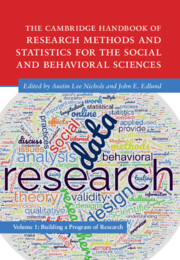 The Cambridge Handbook of Research Methods and Statistics for the Social and Behavioral Sciences
The Cambridge Handbook of Research Methods and Statistics for the Social and Behavioral Sciences Book contents
- The Cambridge Handbook of Research Methods and Statistics for the Social and Behavioral Sciences
- Cambridge Handbooks in Psychology
- The Cambridge Handbook of Research Methods and Statistics for the Social and Behavioral Sciences
- Copyright page
- Dedication
- Contents
- Figures
- Tables
- Contributors
- Preface
- Part I From Idea to Reality: The Basics of Research
- Part II The Building Blocks of a Study
- 9 Participant Recruitment
- 10 Informed Consent to Research
- 11 Experimenter Effects
- 12 Debriefing and Post-Experimental Procedures
- Part III Data Collection
- Part IV Statistical Approaches
- Part V Tips for a Successful Research Career
- Index
- References
12 - Debriefing and Post-Experimental Procedures
from Part II - The Building Blocks of a Study
Published online by Cambridge University Press: 25 May 2023
- The Cambridge Handbook of Research Methods and Statistics for the Social and Behavioral Sciences
- Cambridge Handbooks in Psychology
- The Cambridge Handbook of Research Methods and Statistics for the Social and Behavioral Sciences
- Copyright page
- Dedication
- Contents
- Figures
- Tables
- Contributors
- Preface
- Part I From Idea to Reality: The Basics of Research
- Part II The Building Blocks of a Study
- 9 Participant Recruitment
- 10 Informed Consent to Research
- 11 Experimenter Effects
- 12 Debriefing and Post-Experimental Procedures
- Part III Data Collection
- Part IV Statistical Approaches
- Part V Tips for a Successful Research Career
- Index
- References
Summary
The steps social and behavioral scientists take after the end of a study are just as important as the steps taken before and during it. The goal of this chapter is to discuss the practical and ethical considerations that should be addressed before participants leave the physical or virtual study space. We review several post-experimental techniques, including the debriefing, manipulation checks, attention checks, mitigating participant crosstalk, and probing for participant suspicion regarding the purpose of the study. Within this review, we address issues with the implementation of each post-experimental technique as well as best practices for their use, with an emphasis placed on prevention of validity threats and the importance of accurate reporting of the steps taken after the experiment ends. Finally, we emphasize the importance of continuing to develop and empirically test post-experimental practices, with suggestions for future research.
Keywords
- Type
- Chapter
- Information
- The Cambridge Handbook of Research Methods and Statistics for the Social and Behavioral SciencesVolume 1: Building a Program of Research, pp. 244 - 266Publisher: Cambridge University PressPrint publication year: 2023
References
Further Reading
For a detailed example of a funnel debriefing procedure and the empirical test of various post-experimental practices including suspicion probing, we recommend the following article:
For further discussion of the history and progression of manipulation checks as well as specific recommendations for their use, we recommend Table 4 in the following article:
We are proponents of manipulation checks (with the proper precautions), but criticisms of manipulation checks should be seriously considered. For further reading on critiques of manipulation check practices we recommend the following article:
References
- 1
- Cited by
